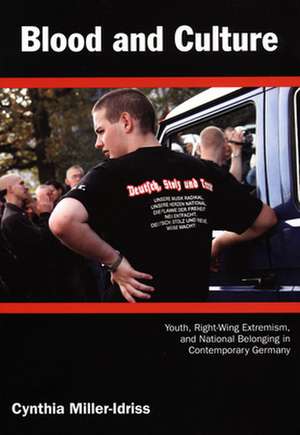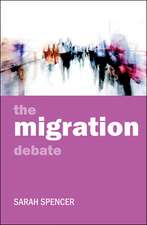Blood and Culture – Youth, Right–Wing Extremism, and National Belonging in Contemporary Germany: Politics, History, and Culture
Autor Cynthia Miller–idrissen Limba Engleză Paperback – 27 aug 2009
Din seria Politics, History, and Culture
-
 Preț: 240.73 lei
Preț: 240.73 lei -
 Preț: 210.26 lei
Preț: 210.26 lei -
 Preț: 247.63 lei
Preț: 247.63 lei -
 Preț: 265.79 lei
Preț: 265.79 lei -
 Preț: 238.39 lei
Preț: 238.39 lei -
 Preț: 261.56 lei
Preț: 261.56 lei -
 Preț: 263.47 lei
Preț: 263.47 lei -
 Preț: 306.60 lei
Preț: 306.60 lei -
 Preț: 264.26 lei
Preț: 264.26 lei -
 Preț: 305.61 lei
Preț: 305.61 lei -
 Preț: 262.70 lei
Preț: 262.70 lei -
 Preț: 303.33 lei
Preț: 303.33 lei -
 Preț: 262.52 lei
Preț: 262.52 lei -
 Preț: 212.48 lei
Preț: 212.48 lei -
 Preț: 261.56 lei
Preț: 261.56 lei -
 Preț: 262.32 lei
Preț: 262.32 lei -
 Preț: 230.02 lei
Preț: 230.02 lei -
 Preț: 237.47 lei
Preț: 237.47 lei -
 Preț: 335.88 lei
Preț: 335.88 lei -
 Preț: 300.83 lei
Preț: 300.83 lei -
 Preț: 261.56 lei
Preț: 261.56 lei -
 Preț: 238.39 lei
Preț: 238.39 lei -
 Preț: 238.01 lei
Preț: 238.01 lei -
 Preț: 262.14 lei
Preț: 262.14 lei -
 Preț: 312.74 lei
Preț: 312.74 lei -
 Preț: 310.83 lei
Preț: 310.83 lei -
 Preț: 300.24 lei
Preț: 300.24 lei -
 Preț: 335.12 lei
Preț: 335.12 lei -
 Preț: 234.61 lei
Preț: 234.61 lei -
 Preț: 223.65 lei
Preț: 223.65 lei -
 Preț: 256.06 lei
Preț: 256.06 lei
Preț: 260.41 lei
Nou
Puncte Express: 391
Preț estimativ în valută:
49.84€ • 51.84$ • 41.14£
49.84€ • 51.84$ • 41.14£
Carte tipărită la comandă
Livrare economică 14-28 aprilie
Preluare comenzi: 021 569.72.76
Specificații
ISBN-13: 9780822345442
ISBN-10: 0822345447
Pagini: 256
Ilustrații: 6 tables
Dimensiuni: 153 x 226 x 18 mm
Greutate: 0.36 kg
Editura: MD – Duke University Press
Seria Politics, History, and Culture
Locul publicării:United States
ISBN-10: 0822345447
Pagini: 256
Ilustrații: 6 tables
Dimensiuni: 153 x 226 x 18 mm
Greutate: 0.36 kg
Editura: MD – Duke University Press
Seria Politics, History, and Culture
Locul publicării:United States
Cuprins
Contents; Preface; Acknowledgments; List of AbbreviationsIntroduction: Citizenship and National Belonging as Cultural Practices; 1. Who Belongs to the Nation?; 2. Being and Becoming in Germany; 3. Germanys Forbidden Fruit; 4. Raising the Right-Wing: Educators Struggle to Confront the Radical Right; 5. Teaching and Unteaching National Identity; 6. Blood versus Birthplace; 7. Conclusion: Generational Change and the Re-Imagining of Nations Appendix A; Appendix B; Notes; Bibliography; Index
Recenzii
In this rare work on everyday understandings of citizenship and nationhood, Cynthia Miller-Idriss helps to dispel stereotypes about allegedly blood-based and racial ideas of German nationhood. She shows that ordinary people (even those particularly suspected to hold racial ideas, such as working-class youth), espouse a cultural and behavioural, rather than biological, idea of nation. Moreover, in making generational experience key to national self-conceptions, she proposes a dynamic, change-centred notion of nationhood. Christian Joppke, author of Selecting by Origin: Ethnic Migration in the Liberal StateBlood and Culture is an extremely important ethnographic account of a phenomenon that is often examined in a quantitative or theoretical manner. Cynthia Miller-Idriss talks to working-class German youth--high-school students in the process of studying a trade--and elicits from them their experience of what it means to be German in a country that is increasingly diverse and where the memory of World War II can no longer serve as an excuse for not expressing national pride. She makes a convincing case that nation-ness differs not only across nations but across generations within the same nation-state.--Mabel Berezin, author of Illiberal Politics in Neoliberal Times: Culture, Security and Populism in the New Europe
"In this rare work on 'everyday' understandings of citizenship and nationhood, Cynthia Miller-Idriss helps to dispel stereotypes about allegedly 'blood'-based and 'racial' ideas of German nationhood. She shows that ordinary people (even those particularly suspected to hold 'racial' ideas, such as working-class youth), espouse a cultural and behavioural, rather than biological, idea of nation. Moreover, in making generational experience key to national self-conceptions, she proposes a dynamic, change-centred notion of nationhood." Christian Joppke, author of Selecting by Origin: Ethnic Migration in the Liberal State "Blood and Culture is an extremely important ethnographic account of a phenomenon that is often examined in a quantitative or theoretical manner. Cynthia Miller-Idriss talks to working-class German youth--high-school students in the process of studying a trade--and elicits from them their experience of what it means to be German in a country that is increasingly diverse and where the memory of World War II can no longer serve as an 'excuse' for not expressing national pride. She makes a convincing case that nation-ness differs not only across nations but across generations within the same nation-state."--Mabel Berezin, author of Illiberal Politics in Neoliberal Times: Culture, Security and Populism in the New Europe
"In this rare work on 'everyday' understandings of citizenship and nationhood, Cynthia Miller-Idriss helps to dispel stereotypes about allegedly 'blood'-based and 'racial' ideas of German nationhood. She shows that ordinary people (even those particularly suspected to hold 'racial' ideas, such as working-class youth), espouse a cultural and behavioural, rather than biological, idea of nation. Moreover, in making generational experience key to national self-conceptions, she proposes a dynamic, change-centred notion of nationhood." Christian Joppke, author of Selecting by Origin: Ethnic Migration in the Liberal State "Blood and Culture is an extremely important ethnographic account of a phenomenon that is often examined in a quantitative or theoretical manner. Cynthia Miller-Idriss talks to working-class German youth--high-school students in the process of studying a trade--and elicits from them their experience of what it means to be German in a country that is increasingly diverse and where the memory of World War II can no longer serve as an 'excuse' for not expressing national pride. She makes a convincing case that nation-ness differs not only across nations but across generations within the same nation-state."--Mabel Berezin, author of Illiberal Politics in Neoliberal Times: Culture, Security and Populism in the New Europe
Notă biografică
Textul de pe ultima copertă
""Blood and Culture" is an extremely important ethnographic account of a phenomenon that is often examined in a quantitative or theoretical manner. Cynthia Miller-Idriss talks to working-class German youth--high-school students in the process of studying for a 'trade'--and elicits from them their experience of what it means to be German in a country that is increasingly diverse and where the memory of World War II can no longer serve as an 'excuse' for not expressing national pride. She makes a convincing case that nation-ness differs not only across nations but across generations within the same nation-state."--Mabel Berezin, author of "Illiberal Politics in Neoliberal Times: Culture, Security and Populism in the New Europe"
Descriere
How generational gaps in national understanding inadvertently increase the appeal to neo-Nazism among working class German youth





















